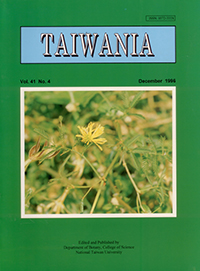Research Paper
Destiny of a 57 Kilodalton Protein in Maize Genotypes Responding to Heat Shock and Pathogenic Infections
Cathy H. Wu and C. Y. Tsai
Published on: December 1996
Page: 329 - 338
DOI: 10.6165/tai.1996.41.329
Abstract
In an effort to elucidate the mechanism of redistribution of a 57 Kda protein from chloroplasts to cytoplasmic polysomes when maize seedlings encounterd a stress, maize genotypes resistant or susceptible to Bipolaris maydis were used for evaluation under inoculated or heat-shocked conditions. Western blot analysis indicated, that the redistributed 57KDa protein caused by a treatment with pathogens or heat shock was identical. When maize seedlings were resistant to pathogens, little amount of this protein could be detected in the cytoplasmic polysome fraction; cytoplsmic polysomes in response to stresses is not unique to maize. A preliminary study employing a compatible Phytophthora megasperma-soybean interaction system indicated that soybean also respond to pathogenic stress in that the 57KDa protein was detected in the preparation of cytoplasmic polysomes.
中文摘要
為了探討玉米幼苗在逆境下,一個57KDa蛋白(Ribosome-associated-protein, RAP)如何由葉綠體轉移至細胞質多核醣體上的機制,乃利用對於Bipolaris maydis感病和抗病的品種為材料,評估這些幼苗接種病菌及熱休克處理情況下的反應。利用Western blot分析的結果證明經由接種或熱休克處理後所產生的RAP是一樣的,而且發現當抗病型的幼苗皆菌種後,此57KDa RAP不會和多核醣體結合,它可能繼續停留在葉綠體中。57KDa轉移的現象不僅發生在玉米幼苗中,大豆感染了Phytophthora megasperma後亦有同樣的現象,而且大豆的57KDA RAP和玉米的蛋白可能極為相似。 關鍵詞:熱休克,玉米,病菌,多核醣體蛋白,逆境
Keyword: Heat shock, Maize(Zea mays L.), Pathogen, Polysome-associated-protein, Stress


